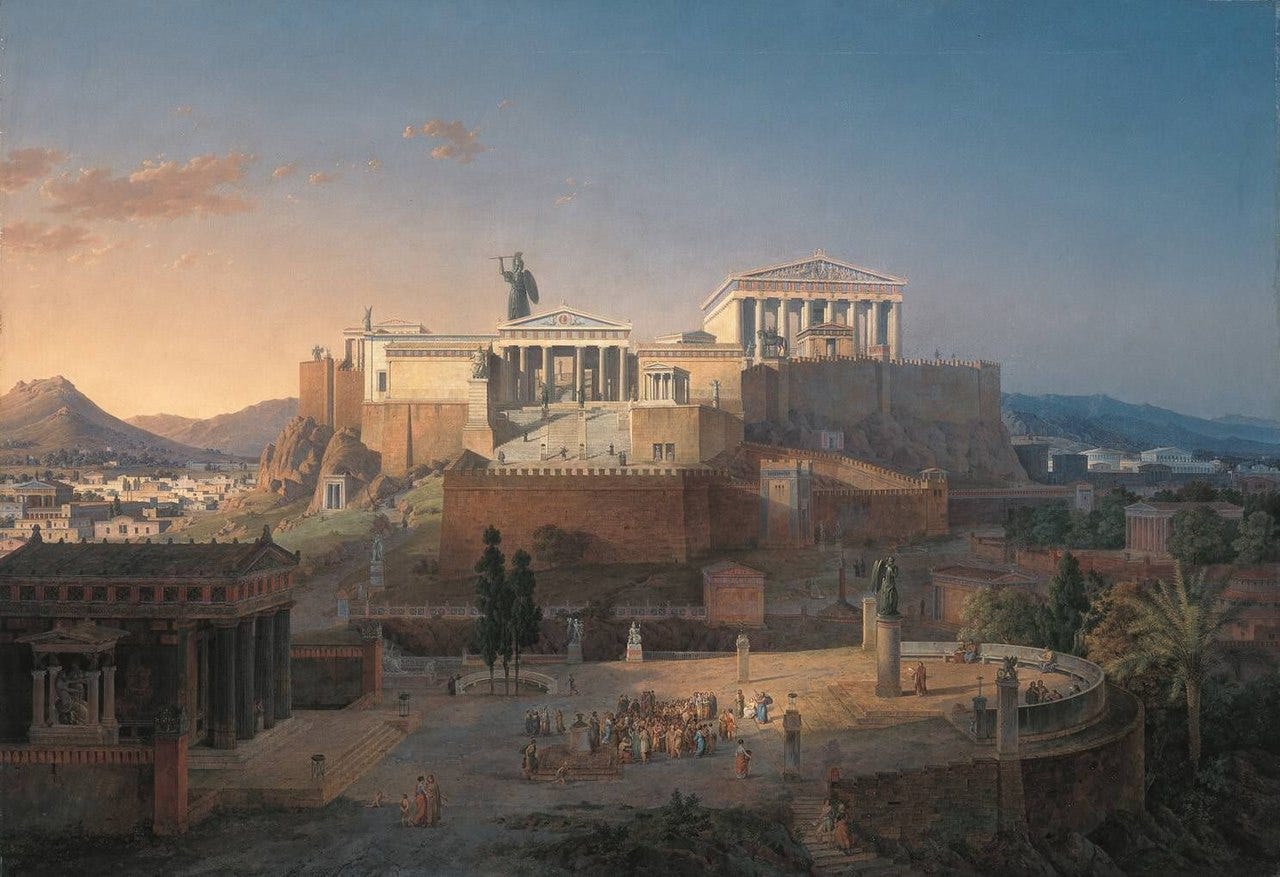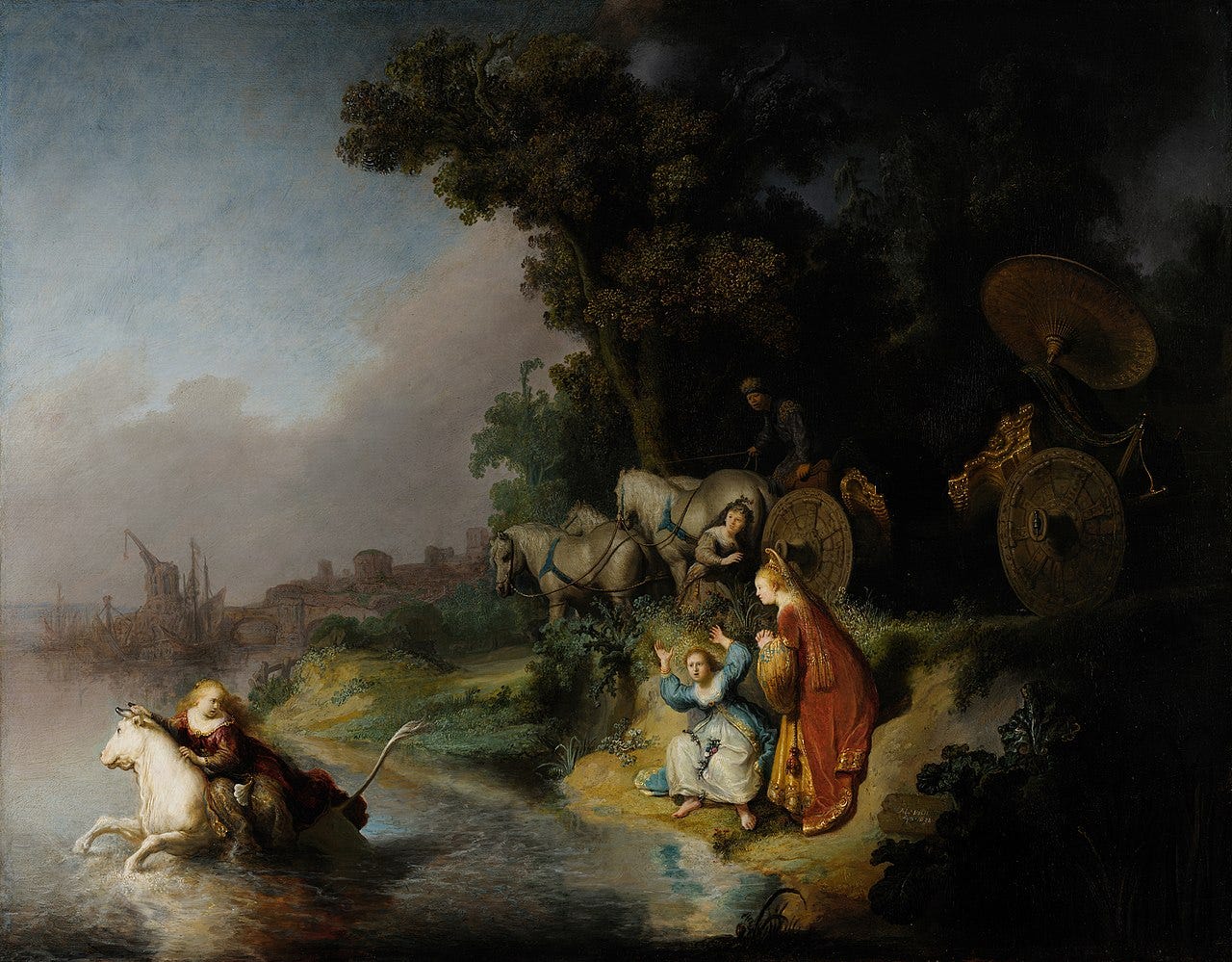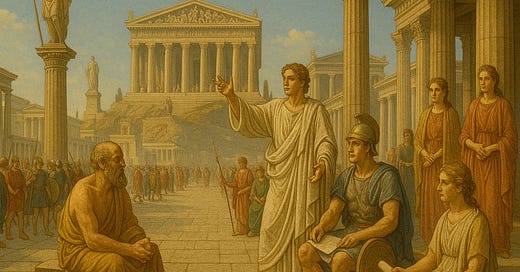All three civilisations, which today have a significant impact on the European continent, have preserved the memory of the imperial glory of the Roman Empire. From Charlemagne to Otto of Saxony in the Holy Roman Empire to Napoleon of France, the West has sought to build on its legacy. Its legacy was still alive in Constantinople, and after its fall, the claim to the imperial heritage of Rome was usurped by Muscovy with the doctrine of the Third Rome.
The ancestors of the three European civilizations thus look back to the splendor and glory of Rome when it ruled from the Danube to the Sahara, which at that time bore no Arab name, and from the Euphrates to the waters of the Atlantic. The Mediterranean was the basin of light, their teachers were the Greeks, Virgil's Aeneid was the Roman continuation of Homer. This civilization was born on both sides of the Aegean and articulated in dozens of city states called polis. Its birth was not one of silence, but of heroic hymns and bronze-sounded verses. Their pantheon was made up of gods similar in character and stature to man, who resided on Olympus. They walked in sunlit certainty, considering themselves the measure of all things, building temples to proportion and law, unaware that beneath the chisel of harmony already crept the worm of decadence.
This civilisation has been called by many different names: according to the period it may be called ancient or classical, according to its setting Mediterranean, according to the ideal or prototype Apollinarian in the manner of Spengler, or according to its bearers Hellenic or Greco-Roman.

Classical civilization emerges from the Dark Ages, with Homer's epics, the Iliad and the Odyssey. Already at its birth we find city states: Athens, Thebes, Argos, Corinth and Sparta on the European shore of the Aegean, and Miletus, Ephesus and Halicarnassus on the Asian shore; after the great colonisation of the Mediterranean, this civilisation spread across the width of the Inner Seas - to the northern shores of the Aegean, to the Sea of Marmara (Byzantion, Chalcedon) and to the Pontic shores of the Black Sea; westwards to Tarentum, Naples and Syracuse, where they formed the so-called Southwards to Cyrenaica and the foundation of Naukratis on the Nile delta, by the founding of Massalia (today's Marseilles). Their influence spread across the Mediterranean to the Iberian and Apennine peninsulas, where their influence permeated the Latin settlement on the lower Tiber which bears the name of Rome.
The sea was their mother; the horizon, their boundary. They built not for eternity, but for perfection, for beauty-in-balance. The Greek polis was not merely a political unit, but a microcosm of a vision of the world. In it, the gods dwelled among men, and man reached for immortality not through revelation, but through glory.
The conquests of Alexander of Macedon opened new horizons for ancient civilization, which at that time was already exhausted by the devastating Peloponnesian War. It opened to it the breadth of the entire Orient, from the west bank of the Nile to the east bank of the Indus. On the conquered satrapies he and his followers founded countless cities in the Hellenistic style, which were to be the beacons of ancient civilisation in the Orient: the many Alexandrias, of which the most famous is that at the mouth of the Nile; Antioch on the lower Orontes in northern Syria; and Seleucia in Mesopotamia, to mention the greatest. The conquest of the Orient and Greek domination had a profound effect on local culture, so powerful that Spengler speaks of a pseudomorphosis of local civilization, and Toynbee sees from the Macedonian conquista a great interruption, a lullaby, ending in the Arab outbursts. The temptation and seduction of Greek customs is evident in the Maccabees - those resisting to Greek with the sword surrendered to them with their soul. The son of a fierce zealot ends up taking the names and customs of those whom his forefathers so vehemently fought.
The attraction of Hellenistic civilization is clearly seen in the book of the Maccabees, when the native royal family that gains power after rebelling against the Greeks eventually adopts Greek customs and names themselves.
Yet this was already twillight. A heroic dusk rather than a new dawn. The soul of Hellas now sought salvation in universalism and cosmopolitanism to deliver it from the cataclysm of fraternal strife. Yet this remedy denied the very essence of Classical civilisation.
Classical civilization eventually united into a universal empire under the banner of Rome. What America was to Europe, Rome was to Greece, writes Amaury de Riencourt in The Coming Caesars. If Hellas was form, Rome was fate. If Hellas was harmony, Rome was order. Their temples were echoes, their gods were renamed. They could preserve but not create. What they achieved was duration. Their glory lay not in achieving new heights but by the width encompassed. They were masters of scale, yet they did not rekindle the extinguished flame of Greek creativity and spontaneity for they could not. And though the Romans did not think in terms of clockwork, as the Frankish of yesterday did, the Imperium Romanum was mechanic when Hellas was organic.
But what was the ethos and worldview of ancient civilization? Krejčí characterizes it as anthropocentric1; the Olympian gods had not only human form but also human characteristics. They were mirrors of human vice and virtue. Olympus was hardly a heaven - it was a theatre. Quigley captures2 the essence of their worldview in a few words: it was a civilization that was aristocratic, clarid , urban, balanced, and mundane. Aristocratic in the way it exalted the honor and reputation of man, clarid in its rationality, urban in its basic form of political organization, balanced in its search for a golden mean, and mundane in its concern for man in this world. Athens, the flower of ancient civilization, depended on the enslaved masses3, and the Spartan barracks depended on the shovel of the subjugated helots.
Herein lies the Classic tragedy. It knew slavery and called it a necessity. It worshipped beauty and reason and had no sense for anything but the particular. Its soul never escaped the flesh and it rejoiced in the visible, the near and the proximate, the tangible and the ordered.
The ancient Greek Hesiod depicts the decline of this civilization in its succession of the Golden, Silver, Bronze, Heroic, and Iron Ages, with each successive phase the world declines and its original perfection becomes more and more eroded4. Hesiod's lament is thus reminiscent of Gibbon's lament The Decline and Fall of the Roman Empire, which inscribed itself in the collective consciousness of ancient civilization and placed the Golden Age in the past5.
Influences on the Classical World
If Frankish civilization takes pride in its Classical and Syriac legacy, rejuvenated by the aristocratic ethos of the Germanic tribes, then it is fitting to ask: What legacy shaped Classical civilization itself? What soil gave rise to this world of marble form and bronze thought, this order of polis and poem, of law and lamentation?
t its foundation, three great sources rise like ancient rivers:
Cnossos, Tyros, and Doros.
Cnossos represents the Caphtorian (Minoan) cradle—the palace culture of Crete, remembered dimly in myths of Labyrinth and Minotaur, of Daedalus and Icarus. Before Homer’s verses rang out, an older world had already whispered of decline and memory. The mythic rhythm of Hesiod—the fading from Gold to Iron—bears the echo of this submerged inheritance. The tragic lens through which the Greeks viewed time may well descend from these early visions of fall and fracture.

Tyros stands for the Canaanite legacy, the Semitic mariners who taught the Greeks to write and to wander. Their alphabet gave the Greeks letters, but their cities gave them an idea: that the city-state, the polis, could be a world entire. Their myths—Europa, Cadmus, Melqart—entered the Hellenic pantheon. From Tyre and Sidon came not just goods and ships, but the bold notion that the sea could be a road, and the horizon a home.
Doros represents the Indo-European warrior aristocracy, the Dorian tribes who swept into Hellas with iron and order. Their ethos—timē, kleos, aretē—formed the backbone of Homeric heroism and Spartan discipline. They brought with them the sky-gods and thunderers, the masculine ethic of honour and combat, and a language tuned to myth and measure. From them came the heroic code that shaped both epic and polity.
But these were not the only voices in the chorus.
To the south, Egypt loomed—majestic, mathematical, and immortal. Its priests read the stars; its temples stretched across centuries. In geometry and medicine, in funerary cult and cosmological vision, it left a subtle but enduring impression on the Greek mind. Plato’s reverence for Egyptian antiquity was no mere rhetoric.
To the east, across Anatolia, lay the lands of Phrygia, Lydia, and Hatti—kingdoms of oracles and omens, of great mother-goddesses and fatal time. From these peoples, the Greeks may have absorbed their sense of moira—of destiny inscribed before birth, of the divine bound by fate. The Anatolian mystery cults, so central in later antiquity, had their prefigurations here.
Thus we see: Classical civilization was not born in solitude, but in synthesis—a harmony of Minoan memory, Phoenician skill, and Dorian fire, tempered by Egyptian science and Anatolian depth. Its gods were local, but its sources were global. Its soul was singular, yet formed from many.
If the West is a legacy of Rome, and Rome a legacy of Hellas, then Hellas itself was a legacy of the ancient world.
KREJČÍ, Jaroslav: Postižitelné proudy dějin, p 54
QUIGLEY, Carroll: Evolution of Civilizations, p. 279
DONOSO CORTÉS, Juan: Essays on Catholicism, Liberalism and Socialism, p. 248
TOYNBEE, Arnold Joseph: A Study of History, Volume VIII., p. 80
QUIGLEY, Carroll: Evolution of Civilizations, p. 338.




